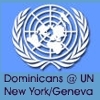

| BRIEFING - February 8, 2012 | To learn more about the Millenium Development Goals, click on the graphic Past Briefings: January 25, 2012 January 11, 2012 December 21, 2011 December 7, 2011 November 9, 2011 October 19, 2011 October 5, 2011 September 21, 2011 September 7, 2011 August 24, 2011 August 10, 2011 June 22, 2011 June 8, 2011 May 11, 2011 April 27, 2011 April 6, 2011 |
|||
Making poverty eradication a global priority
As a follow-up to my last briefing on the Commission for Social Development, I would like to highlight a few of the areas of greatest concern to the NGO community in terms of the priority theme—poverty eradication—namely, the connection between climate change and poverty eradication, and, financing efforts at poverty eradication: Where will the money come from? One of the NGO-sponsored side events I attended last week was entitled “Poverty and Climate Change: Lives in the Balance.” We were reminded that climate change is a cross-cutting issue, in that it impacts the environmental, social and economic dimensions of development. In fact, the two greatest challenges we face in these our times may well be that of lifting up the global poor, and, stabilizing Earth’s climate. Climate change is a fact. There is no way to stop it. All we can, and must do, is adapt to it and make every effort to help mitigate the disastrous effects it has and will continue to have on the world’s most vulnerable populations. It is important to note that since women and children are the overwhelming majority of those who live in poverty, they are also at greatest risk for the negative impacts of climate change. Rural women are the backbone of agriculture in the developing world. They are the ones who save seeds, plant, harvest, process and market produce. Estimates indicate that they are responsible for approximately one-half of the world’s food supply. However, the traditional weather patterns that they have come to rely upon have been disastrously altered. Two Sisters of Notre Dame de Namur from the Democratic Republic of Congo said that the nine-month rainy season, followed by three dry months, was always reliable. But now, perhaps there are five months of rain, and harvesting is unpredictable. A speaker from Kenya said that each year the rains would arrive in November… but, no more. The Ambassador of the Maldives, which is made up of 1,190 coral islands in the Indian Ocean, said that climate change threatens the very existence of his nation—since the Maldives are largely dependent upon imported food, as climate change impacts food production, and prices begin to soar, the food security of the Maldivians will be questionable. Last fall, the Pontifical Justice and Peace Council issued a statement urging major economic reform entitled “Towards Reforming the International Financial and Monetary Systems in the Context of a Global Public Authority.” One of the recommendations in this statement calls for taxation measures on financial transactions. “Such taxation would be very useful in promoting global development and sustainability according to the principles of social justice and solidarity.” The NGO Committee for Social Development, along with civil society organizations worldwide, has been advocating for a Financial Transaction Tax (FTT). This would be a small tax (e.g. 0.05 percent) on all financial market transactions. You might want to think of it this way: any time you and I make a purchase, we pay a tax on the amount. Meanwhile, millions of dollars are bought and sold each and every day in the world’s financial centers, completely tax-free, making the rich ever-richer. The Financial Transaction Tax is considered by many economists to be an innovative source of financing for development, and an efficient means of assisting developing countries to achieve the Millennium Development Goals, eradicate poverty, protect the environment and lay the foundation for sustainable development. It would also serve as a way to reduce the destabilizing effects of downturns in the financial markets, reduce speculative trading and help mitigate fluctuations of asset prices in stock markets as well as in commodity prices. Over the long term, a Financial Transaction Tax could be a steady and predictable stream of funding for poverty eradication. Another potential pool of resources for poverty eradication is that of a reduction in current levels of military spending. It is interesting to note that following the global financial and economic crisis of 2008-2009, public spending for social development decreased, even as military spending increased. The annual cost of achieving the eight Millennium Development Goals is estimated to be $329 billion (U.S. dollars), which represents approximately one-fifth of current annual military spending. In 1967, Pope Paul VI suggested that a portion of global military budgets be channeled into a global humanitarian fund for development, and said that “development” is the new name for peace. Can you imagine what the world would be like today if his advice had been heeded? There can be no serious commitment to poverty eradication without addressing this issue. The outcome document currently under negotiation by the members of the Commission for Social Development makes no mention of reduced military budgets, nor does it consider any concrete proposals for financing efforts aimed at poverty eradication. The one mention of climate change in the document is strongly opposed by the United States. Regardless of what the final document contains, or omits, the NGO community is committed to ongoing advocacy to highlight these issues and to foster a level of discourse that is holistic and inclusive, making the connections between and among the issues that is so vitally important for both the peoples of Earth and the planet itself.
|
Dominican Leadership Conference
Building relationships and collaborating in the mission of preaching the Gospel
29000 West Eleven Mile Road
Farmington Hills MI 48336
248-536-3234 Contact: Executive Director
